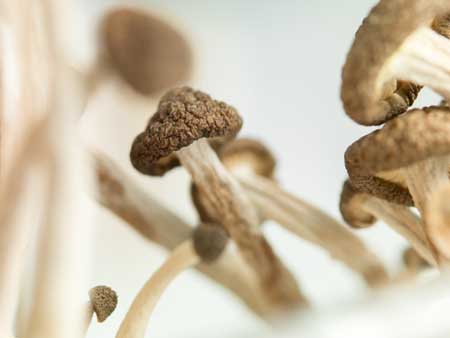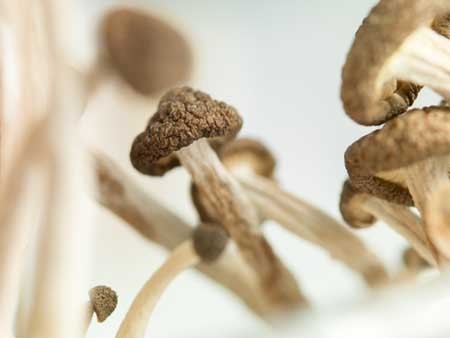A Case Report: Good Effect of Psilocybin Even with No Psychedelic Effects
Highlights from the International Society for Bipolar Disorders Conference Posters and Presentations, Chicago, June 22-25, 2023
Marisa Leon-Carlyle reported on a 43 yr. old man with chronic treatment refractory depression who was given psilocybin 25mg (a 5HT2A agonist) at 8:00 AM after receiving trazodone 200mg HS (which should be enough to block 80% of 5HT2A receptors). He had an excellent antidepressant response, was able to feel emotion and new love for his wife, and finally felt that doing one’s best is good enough. Obviously further systematic study is needed.
High Response Rate to Psilocybin in Bipolar II Depression
Highlights from the International Society for Bipolar Disorders Conference Posters and Presentations, Chicago, June 22-25, 2023
Scott Aaronson gave 15 medication-free BP II patients (off all medications) 25mg of psilocybin with extensive therapeutic support. He saw rapid onset and persistent AD effects, such that at the end of 12 weeks 12 of the 15 patients were still in remission. Quality of life increased and suicidal ideation decreased. He indicated that others found that serum BDNF increased 1000 fold greater than baseline.
Antidepressant Effects of Psilocybin in Unipolar Depression
Highlights from the International Society for Bipolar Disorders Conference Posters and Presentations, Chicago, June 22-25, 2023
Alan Young reported on 233 patients with treatment refractory depression who were given 10mg then 25mg of psilocybin, 1 week apart.
There was intensive therapeutic support before, during, and after the ingestions. Patients experienced it as a waking dream. Response was rapid in onset and 20% response persisted at least through week 12.
“Pharmacotherapy of Bipolar Depression”
Roger McIntyre gave a talk on the “Pharmacotherapy of Bipolar Depression” at the International Society for Bipolar Disorders Conference in Chicago, June 22-25, 2023
He pointed out that, contrary to the many approved agents for mania, there were few FDA-approved drugs for depression in patients with Bipolar Disorders. These approved drugs included: cariprazine (Vraylar); lumateperone (Caplyta); lurasidone (Latuda); quetiapine (Seroquel); and the olanzapine-fluoxetine combination (Symbyax). Other non-approved agents include: lithium, lamotrigine, antidepressants, MAOIs, pramipexole, carbamazepine, ketamine, bupropion+dextromethorphan, amantadine, memantine, and possibly minocycline and celecoxib. Surprisingly, more than 3,000 bipolar depressed patients have been reported to be taking ketamine and that this was not associated with the induction of hypomania or mania.
McIntyre reported on the antidepressant (AD) effects of intra-nasal (i.n.) insulin. The insulin receptor sensitizer metformin had AD effects, but only in those who converted to insulin sensitivity.
McIntyre reported on the mixed effects of the GLP-1 agonists in the prevention of depression (Cooper et al J. Psychiatric Res, 2023). This is of interest in relationship to the bidirectional relationship of diabetes mellitus and depression.
Liraglutide appeared to have an anti-anhedonia effect. Semaglutide had AD and antianxiety effects in animal models of depression.
Recent studies have explored the antidepressant effect of psilocybin. Small studies have indicated that it has rapid onset of AD effects, and, in contrast to ketamine where rapid onset AD and anti-suicidal effects are short lived, the AD effect of psilocybin may be more prolonged.
Ketamine repairs structure and function of prefrontal cortical neurons via glutamate NMDA receptor blocking action, while psilocybin and other psychedelics act via stimulating 5HT2A receptors. One single case study suggested that blocking 5HT2A receptors with trazodone could achieve a rapid onset of AD effects of psilocybin without the psychedelic effects, a very interesting finding that requires replication.
An Open Label Study of Synthetic Psilocybin in Bipolar Type II Depression
Highlights from Posters Presented at the Society of Biological Psychiatry Meeting, April 27-29, 2023 in San Diego
Scott Aaronson reported on patients receiving a single dose of synthetic psilocybin. All subjects had three preparatory sessions prior to dosing and three integration sessions post dosing and were followed for 12 weeks.
“At the three week primary outcome measure, 11 of 14 participants (78.6%) met remission criteria.” They concluded: “Most subjects reported significant improvement in chronic depressive symptoms without hypomania or suicidality and durability lasting for three months follow-up.”
Single-dose psilocybin-assisted therapy in major depressive disorder: a placebo-controlled, double-blind, randomized clinical trial
von Rotz et al reported in eClinical Medicine (the Lancet) that a single dose of psilocybin produced a huge AD (anti-depressant) effect compared to placebo. A dose of 0.215mg Kg (about 15mg for a 70kg person) had a rapid onset AD effect that persisted for at least 14 days. Music was played and in a living room like environment. Psychological support was provided on 3 visits pretreatment and on days 8 and 14 for a total of 14 hours
Review Describes Latest Findings on the Mechanisms of Psychedelic Drugs and Their Therapeutic Potential
In a 2021 review article in a special issue of the Journal of Neurochemistry devoted to “Psychedelics and Neurochemistry,” researcher Alaina M. Jaster and colleagues summarized recent findings on psychedelic drugs, including their potential as treatments for psychiatric disorders and the structural changes they produce in the brain. The review article focused on findings in humans and provided background context based on findings in animals, particularly rodents.
In the article, Jaster and colleagues write that psychedelics “have in common a battery of acute (within minutes to hours) effects in humans that include profound changes in processes related to perception, cognition, sensory processing, and mood.” They are not considered to be addictive, and recent research has identified fast-acting and long-lasting therapeutic effects of psychedelics, particularly for the treatment of depression and substance abuse.
While psychedelic drugs interact with the brain in complicated ways, the role of serotonin 5-HT2A receptors seems to be crucial to their effects. Psychedelics have classically been divided into two groups based on their chemical structures: phenethylamines (which include mescaline and its synthetic analog DOI) and tryptamines (which include psilocybin/“magic mushrooms,” DMT/ayahuasca, and ergolines like LSD, which are sometimes separated into a third category). The authors of the review highlight that other substances with different chemical structures that do not fit into this classification can also function as psychedelics. Examples include efavirenz and quipazine, which both activate serotonin 5-HT2A receptors and change rodent behavior in the same way that other psychedelic drugs do. These drugs are providing new directions for research into how psychedelics work at both serotonin 5-HT2A receptors and monoaminergic G protein-coupled receptors (GPCRs).

Rodent studies are often used to investigate how psychedelic drugs work. Rodent behaviors such as ear scratching and head twitching increase when the rodents are given drugs that have psychedelic effects in humans. These behaviors return to normal when rodents are given drugs that function as serotonin 5-HT2A receptor antagonists, preventing the stimulation of these serotonin receptors.
While it has been established that serotonin 5-HT2A receptors play an important role in the hallucinogenic effects of psychedelic drugs, how serotonin receptors are involved in some of the therapeutic effects of psychedelics, such as antidepressant effects and changes to synaptic plasticity, is not yet clear.
According to the review, “A number of studies in animal models as well as postmortem human brain samples from subjects with depression and controls has provided evidence that mood disorders occur in conjunction with a reduction in the density of dendritic spines, particularly in the frontal cortex.” Dendrites are the projections from the cell bodies of neurons upon which nerve endings from the axons of other neurons synapse. The surface of these dendrites is covered in mushroom-shaped spines that help create these synaptic connections. The review describes in vitro and in vivo research on mice that suggests that the psychedelics DOI, DMT, and LSD can remodel dendritic spines.
At a recent scientific meeting, researcher Javier González-Maeso, one of the authors of the review, described findings from a recent study of mice given DOI. The structure of the dendritic spines in the prefrontal cortex changed rapidly in these mice. They had also been conditioned to produce a fear response, and the extinction process to get rid of this learned fear was sped up in the mice given DOI. These effects occurred via the serotonin 5-HT2 receptors. The exposure to the psychedelic also affected the regulation of genes involved in synaptic assembly for days, suggesting that epigenetic-induced changes in synaptic plasticity may underlie some of the long-lasting therapeutic effects of psychedelics.
The review also addressed “microdosing,” the recreational practice of consuming small amounts of psychedelics such as psilocybin or LSD, based on the theory that amounts too small to create a hallucinogenic effect may instead produce therapeutic results. The authors find limited data to support microdosing. Most studies in humans and rodents have found no effect or, in the case of one rat study, a worsening of dendritic spine density following microdosing.
Psilocybin Comparable to Escitalopram in the Treatment of Depression

Four randomized, controlled clinical trials have established that psilocybin, the hallucinogenic compound in “magic mushrooms,” has anti-depressant effects. Recently, a phase 2 clinical trial compared the effects of psilocybin to a US Food and Drug Administration (FDA)–approved treatment for depression, the selective serotonin-reuptake inhibitor (SSRI) escitalopram. The study by Robin Carhart-Harris and colleagues was published in the New England Journal of Medicine in 2021.
The 59 participants in the 6-week study, which took place in the United Kingdom, had longstanding moderate-to-severe major depressive disorder. They were randomized to two groups. The psilocybin group received two separate doses of 25 mg of psilocybin 3 weeks apart, plus 6 weeks of daily placebo. The escitalopram group received two separate doses of 1 mg of psilocybin 3 weeks apart plus 6 weeks of daily oral escitalopram. (The small doses of psilocybin administered to the escitalopram group were assumed to have negligible psychiatric effects.) All participants were told they would receive psilocybin (though not the dose) in order to standardize their expectations.
In addition to the drug treatments, all participants also received psychological support, which consisted of monitoring immediately after the administration of the drugs (given the expectation that the 25mg dose of psilocybin would produce an “altered quality of conscious experience”), psychological debriefings, and an active listening session.
Psilocybin improved depression symptoms to a greater extent than escitalopram did. Among the participants, 70% of the psilocybin group responded to the treatment, compared with 48% of the escitalopram group. Remission occurred in 57% of the psilocybin group compared with 28% of the escitalopram group. These differences in the outcomes for the two groups were not statistically significant.
The FDA has designated psilocybin a “Breakthrough Therapy” for severe depression, which indicates that the therapy may be a substantial improvement over existing therapies for a serious condition. The designation is intended to speed up the drug development and review process.
The state of Oregon legalized psilocybin-assisted therapy in 2020.
Psilocybin May Improve Treatment-Resistant Depression
A small, uncontrolled study in the journal Lancet Psychiatry suggests that psilocybin, an ingredient in hallucinogenic mushrooms, relieved depression symptoms for up to three months in seven of 12 participants with unipolar depression that had not responded to at least two antidepressant medications.
Psilocybin has a different mechanism of action than typical treatments for depression. It activates 5HT2A serotonin receptors.
The participants, who had moderate to severe depression, were given two oral doses of psilocybin, a low dose (10mg) to establish the safety of the intervention, and a higher dose (25mg) seven days later. Psychedelic effects (anxiety, confusion, nausea, and headache) peaked within two to three hours and had dissipated by six hours after the intervention.
Depression began to improve within 24 hours after the 25mg dose. Depression symptoms were significantly improved by one week after the intervention. Eight of the 12 participants had a complete remission of their depression after one week, and this lasted the full three months in five participants. By the end of the three months, a total of seven of the 12 participants met the criteria for response to psilocybin.
The study’s authors, led by Robin L. Carhart-Harris, suggest that their preliminary results warrant more systematic investigation of psilocybin, but because there was no comparison group in this study, a large placebo effect cannot be ruled out.


